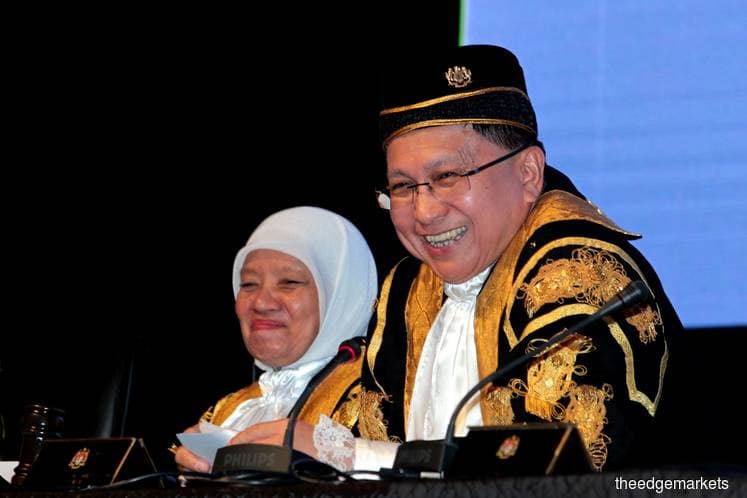
PUTRAJAYA (Jan 11): Malaysian judges and judicial officers have received training from the United States Department of Justice (DOJ) on how to deal with modern crimes, said Chief Justice Tan Sri Richard Malanjum.
He said the DOJ has been very active in exposing and training the judges and judicial officers to handle modern crimes such as money laundering, crypto currency fraud, terrorism and human trafficking.
The DOJ started the training last year.
“The United Nations Development Programme (UNDP) is another international organisation which has been very helpful to our judiciary, especially in handling public interest litigation.
"The local universities too are assisting in one way or another. These trainings take time to mature. Indeed, we must remember that Putrajaya was not built in one day,” he said in his speech at the launch of Legal Year 2019 at a hotel here today.
The top man in the judiciary also said the Judicial Academy of the Judicial Appointments Commission has been organising regular in-house training for judges in several areas of the law.
As part of that, he said the judiciary is in discussion to bring in experienced judges from the United Kingdom to share with the Malaysian judiciary, their experiences in effective case management.
“We are also in serious discussion with the Singapore Judiciary in knowledge sharing programmes. In March, there will be one programme being organised with the help of the Singapore Judiciary,” he said.
On another point, Malanjum said the judiciary had made one solemn declaration, that is to uphold the Rule of Law and zero tolerance to any form of corruption and judicial interference, whether internal or external, political or otherwise, in the execution of judicial duties.
“We welcome information if any of such occurs. I can assure you that swift action will be taken in accordance with the law. The Judiciary remains and will remain steadfast in upholding its independence,
“We are very conscious that one of the reasons why the public has a negative perception on the courts is that our decisions at times are not in tune with public feelings or the will of the majority. Our response to this is a request for understanding on the functions of the courts. Our court is a court of law and not of the mob,” he said.
He said being a branch and being independent did not mean that the judiciary must act at all times as checks on the other branches (the Legislature and the Executive) and that the three branches should work together and respect each other’s boundaries.
Malanjum also urged junior lawyers to do free legal aid for the unrepresented instead of leaving the senior lawyers merely mourning for the poor souls.
He said newly-admitted lawyers should do as many as possible pro bono works in courts for it will give them the experience and confidence in court later on.
On another issue, Malanjum also said that the judiciary was in discussion with government departments such as the Prisons Department and Welfare Services Department.
“We are encouraging our judges and judicial officers to consider imposing community services instead of imprisonment to offenders in appropriate cases. In this way, not only it may better rehabilitate the offenders, it is also cost savings for the prisons,” he said.
Later during a press conference, asked on the community service, he said judges and magistrates should have to consider to punish the accused person in the form of community service for lesser offences, instead of locking up such offenders in prison as it would also help reduce congestion in prisons.
He said there was a provision provided for in the Penal Code to sentence the accused person in the form of community service for lesser offences.
"The move has been implemented in Sabah where I feel it is successful. They (offenders) would wear the (prison) attire while doing community service.
"As they face the public (while doing community service), they will then be ashamed, rather than be spending one or two weeks in prison," he said.
About 500 guests comprising High Court judicial commissioners, High Court judges, Court of Appeal judges, Federal Court judges, higher management of the office of the Federal Court Chief Registrar and judicial officers attended the opening of the Legal Year 2019.
During the ceremony, Minister in the Prime Minister’s Office in charge of law, Datuk Liew Vui Keong also launched a book entitled Judicial Review Guide for Public Officers: An Introduction. The book can be downloaded from the judiciary website (www.kehakiman.gov.my).